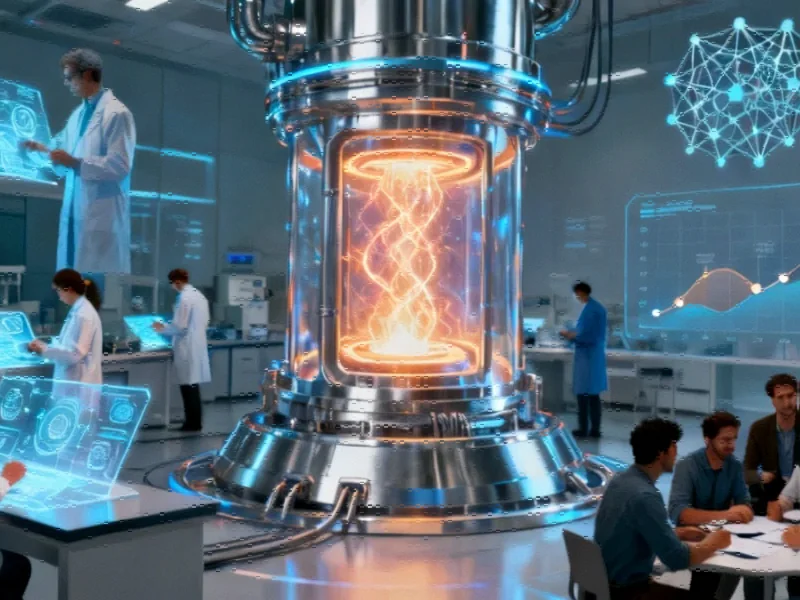Revolutionizing Clean Hydrogen Through Nuclear Innovation
Robert Gordon University (RGU) has secured an £800,000 grant to accelerate the development of groundbreaking hydrogen production technology that utilizes waste steam from nuclear facilities. This significant funding from the Engineering and Physical Sciences Research Council (EPSRC) positions RGU at the forefront of clean energy innovation, with potential implications for global decarbonization efforts.
Table of Contents
- Revolutionizing Clean Hydrogen Through Nuclear Innovation
- Advanced Electrolyser Technology Development
- Strategic Collaboration and Institutional Expertise
- Technical Innovations and Manufacturing Breakthroughs
- Nuclear Integration and Decarbonization Potential
- Broader Implications for Clean Energy Transition
Advanced Electrolyser Technology Development
The research team, led by Professor Nadimul Faisal at RGU’s School of Computing, Engineering and Technology (SoCET), is focusing on enhancing solid oxide steam electrolysers (SOSE) – a highly efficient technology that produces clean hydrogen using electricity and heat from renewable and nuclear sources. What makes this research particularly innovative is the team’s previous breakthrough in designing a tubular cell capable of withstanding the extreme temperatures (600-900°C) required for SOSE systems to operate effectively.
Professor Faisal emphasized the project’s significance, stating: “Hydrogen is central to achieving the UK’s net-zero goals. This investment allows us to push forward the science and engineering needed to make solid oxide steam electrolysis commercially viable, while creating new opportunities for sustainable innovation in partnership with industry.”, as comprehensive coverage
Strategic Collaboration and Institutional Expertise
The project, known as METASIS 2.0 (UKRI3156), represents a continuation of RGU’s growing expertise in hydrogen research. Professor Mamdud Hossain highlighted the university’s track record, noting: “RGU has built an excellent reputation in hydrogen research, both applied through a number of Knowledge Transfer Partnerships and increasingly on curiosity-driven research as evidenced by the back-to-back EPSRC grants.”
The research consortium brings together leading institutions including the University of Surrey, Aston University, and the UK’s National Nuclear Laboratory (NNL), along with more than a dozen additional partners. This collaborative approach ensures diverse expertise and maximizes the project’s potential impact.
Technical Innovations and Manufacturing Breakthroughs
Dr. Bahman Amini Horri from the University of Surrey detailed the technical advancements: “We are developing the next generation of steam electrolysers to produce sustainable hydrogen in an efficient and affordable way. The technology uses innovative heterogeneous electrolyte composites recently developed at the University of Surrey, which are integrated into coating layers applied to traditional porous ferritic steel tubes, serving as a cost-effective manufacturing method.”
This manufacturing approach represents a significant step toward commercial viability, addressing one of the key challenges in hydrogen production – cost efficiency.
Nuclear Integration and Decarbonization Potential
The involvement of the National Nuclear Laboratory underscores the project’s strategic importance in leveraging nuclear infrastructure for clean energy production. Dr. Mark Bankhead of UKNNL commented: “We at UKNNL are looking forward to supporting the team and to encourage the development of low-TRL technologies that could increase the potential of new nuclear to drive decarbonization. Having supported the team in the previous grant award, we are delighted to have the opportunity to continue this potentially groundbreaking research that could utilize both the heat and electrical power from a nuclear reactor to produce low carbon hydrogen fuel.”
Broader Implications for Clean Energy Transition
This research initiative addresses multiple critical aspects of the clean energy transition:
- Waste Utilization: Converting waste steam from nuclear facilities into valuable clean hydrogen
- Temperature Resilience: Developing materials that can withstand extreme operating conditions
- Cost Reduction: Creating more affordable manufacturing processes for hydrogen production
- Infrastructure Synergy: Leveraging existing nuclear infrastructure for additional clean energy output
The project builds on previous breakthroughs at RGU in steam-based hydrogen production, demonstrating the university’s consistent commitment to advancing clean energy technologies. As nations worldwide seek practical pathways to net-zero emissions, innovations like those emerging from the METASIS project could play a crucial role in making clean hydrogen a commercially viable and widely available energy source.
The successful implementation of this technology could transform how we think about nuclear energy’s role in the clean energy ecosystem, creating new revenue streams for nuclear facilities while accelerating the transition to a hydrogen economy.
Related Articles You May Find Interesting
- Barloworld Nears Delisting as Newco Secures 90.7% Controlling Stake
- Major Data Center Expansion Set for Minnesota’s Northland with Fortune 50 Backin
- Jersey Firms Cite Workforce Gaps as Major Growth Barrier in Economic Survey
- European Aerospace Giants Forge Alliance to Compete in Global Space Race
- IBM’s $9.5 Billion AI Momentum Fuels Triple-Digit Growth Across Business Units
References
- https://www.rgu.ac.uk/
- https://www.rgu.ac.uk/news/news-2024/6855-rgu-researchers-make-steam-based-hy…
This article aggregates information from publicly available sources. All trademarks and copyrights belong to their respective owners.
Note: Featured image is for illustrative purposes only and does not represent any specific product, service, or entity mentioned in this article.



